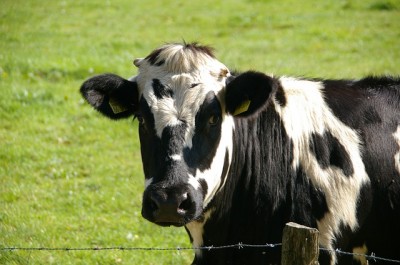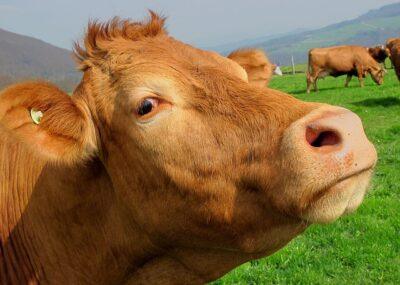Are you considering adding a cow to your homestead?
Regardless of your preferred cow – beef, dairy or a combination of the two – there are some points to consider.
For one, try to purchase a cow that comes from an operation as similar to yours as possible. This will eliminate a lot of problems.
Cattle from large commercial operations tend to be treated as production units. They are given the finest feeds and have a veterinarian on staff to tend to every ailment. They have lost much of the natural instincts needed to survive in the homestead or small farm environment.
Ailments can be expensive and heartbreaking. Look for cattle that have some natural immunity rather than coming from a long line of pampered cows that get a shot for every sniffle. This will go a long way toward keeping the vet bill down and you’ll be much happier.
Another consideration is your primary reason for having a cow. The most common reasons are for beef or dairy. Perhaps you’re hoping to find a cow that will provide both.
Learn How To Keep A Cow Healthy, Happy And Productive
Seventy-five years ago it was much easier to find dual-purpose cows. Agriculture today leans more toward developing breeds that are best suited for one purpose.
Dual-purpose cattle are one of the older breeds, such as Dexter or the American Milking Devon.
Many times these older breeds are hard to locate and expensive. It could mean a long trip and two to three times what you might expect to pay for something local.
Another option if you want a dual-purpose cow is to buy a dairy cow to milk and then breed her with beef bull. The resulting calf will be much better than a straight dairy breed when it came time to slaughter.
Once you narrow down what type of cow you are looking for it’s time to visit some farms.
First, look at the general appearance of the cow.
Here’s a quick checklist:
- Does the cow appear bright-eyed and alert?
- Are they active and curious?
- Legs should appear strong and feet squarely on the ground.
- Cows should move freely with a smooth gait.
- No coughing, wheezing, labored breathing, sneezing, nasal discharge or weepy eyes.
- No wounds, knots or bumps.
- You’re basically looking for cattle that look, act and sound healthy.
Pay attention to the cow’s temperament or disposition. When purchasing a cow for your homestead, the last thing you want is a cow that is as wild as a deer. Observe the cow as you walk up to it. Does it shy away or seem skittish and jumpy?
If other cattle are present, look at the entire herd. Do they seem curious and attentive or ready to bolt at any second?
Finally, talk to the seller to get an idea of their farming philosophy. Do they vaccinate? Use chemical wormers? Do they feed or inject growth hormones?
These are all personal choices. However, if the cow or calf you’re looking at comes from generations of cows that have been given chemical additives, chances are they will be a challenge to incorporate into the homestead. Without these chemical crutches, it may be a struggle to keep those particular cows healthy.
Keep these things in mind when choosing a cow for your homestead. It will help you ensure a great experience with your very first cow.
Harness The Power Of Nature’s Most Remarkable Healer: Vinegar. Read More Here.
 Off The Grid News Better Ideas For Off The Grid Living
Off The Grid News Better Ideas For Off The Grid Living





